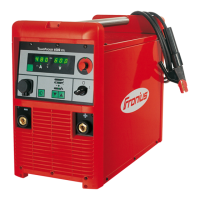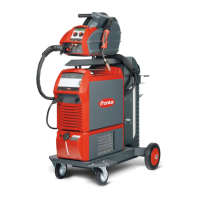12
Options
Fig.13 LocalNet distributor - passive
“LocalNet passi-
ve“ distributor
The “LocalNet passive” distributor makes
it possible to connect up and run several
system add-ons on the LocalNet connec-
tion jack of the power source or of the
wirefeeder at the same time - e.g. TR
3000 and TR 1100 simultaneously.
NOTE! The “LocalNet passive” distributor only functions properly if both ends
of the distributor are in use / connected.
“LocalNet active”
splitter
The LocalNet active splitter provides a
total of three LocalNet jacks at the rear of
the power source. This permits simultane-
ous operation of numerous system add-
ons.
NOTE! If individual connection
jacks are left unassigned, it is
preferable to use the metal
LocalNet jack (56).
(56) Metal LocalNet jack
(57) Plastic LocalNet jacks
Fig.14 Rear view of TP 4000 / 5000 CEL with
LocalNet active splitter
A particular advantage of LocalNet active over the “LocalNet passive” splitter is found
when working with temporarily connected LocalNet users such as the RCU 4000
remote control panel. Unlike with the “LocalNet passive” splitter, it is possible here to
leave individual connection jacks unassigned when the extra users are no longer
needed
(57)
(56)
(57)

